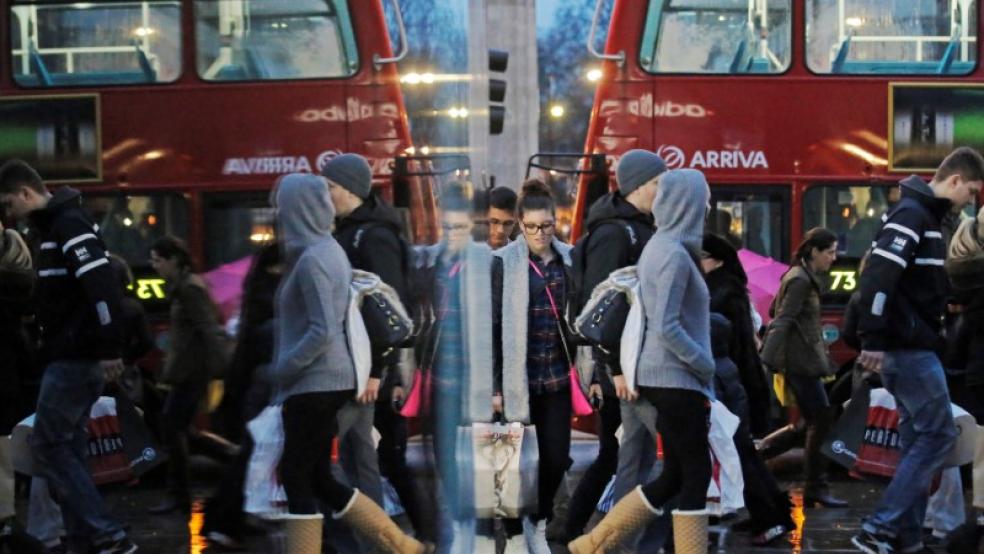LONDON (Reuters) - Britain's economy looks set for a subdued run-up to Brexit, according to a range of indicators that paint a mixed picture at the start of the country's last full year in the European Union.
Forecasters generally think the world's sixth-largest economy will continue to expand at a slow but steady pace during 2018, a better prospect than the gloomy predictions made around the time of the shock vote to quit the bloc in mid-2016.That means Britain is again likely to lag behind a recovering euro zone and most of its wealthy counterparts among the Group of Seven countries. Predictions vary widely, due to uncertainties about the outcome of the Brexit negotiations and the future of Prime Minister Theresa May's weakened government.Forecasts for growth in 2018 range from just 0.3 percent to 2.2 percent with a central view of 1.3 percent, according to a Reuters poll of economists published last month. [ECILT/GB]GROWTHBritain lagged every other G7 country in terms of growth over the first three quarters of 2017 and has been outpaced by the euro zone ever since the Brexit referendum.Business surveys suggest it is likely to have matched the quarterly 0.4 percent economic growth it managed between July and September in the final three months.That would give a conservative slant to last month's Reuters poll forecast of 1.5 percent for 2017 as a whole.With Brexit due in less than 15 months, many think 2018 will be tougher, with the same poll pegging annual average growth for this year at around 1.3 percent.The Bank of England expects the economy will grow by an above-consensus 1.6 percent in 2018, while the Office of Budget Responsibility predicts 1.4 percent. [ECILT/GB]To view a graphic on UK ranks bottom of the G7 pack for growth, click: http://reut.rs/2CsNykATo view a graphic on UK economy forecasts in 2017 maybe too gloomy, click: http://reut.rs/2CuiWPwINFLATION AND WAGESInflation hit its highest level in nearly six years in November at 3.1 percent. The BoE and many economists think that will prove to be the peak, giving some relief to households that have seen the value of their earnings eroded by rising prices.Helping matters, sterling looks likely to hold around $1.34 to $1.36 through this year, according to a Reuters poll out this week. [GBP/POLL]Wage growth looks likely to pick up in 2018, although previous forecasts on pay have tended to err on the optimistic side.House prices are set to extend a slow march higher next year, apart from in London where they are likely to fall. [GB/HOMES]To view a graphic on UK inflation and wages, click: http://reut.rs/2CrwkE1HOUSEHOLD SPENDINGHousehold spending is the main driver of Britain's economy and it increased by just 1.0 percent year-on-year during the third quarter of 2017, the weakest rise since 2012. Economists will be keeping a close eye on this: an outright fall in annual household spending is usually, but not always, a symptom of recession. To view a graphic on UK household spending, click: http://reut.rs/2CU4zVDMIGRATIONNet migration to Britain recorded its biggest plunge in recent decades in the 12 months after the Brexit vote with three-quarters of the drop due to more EU citizens leaving and fewer arriving.The BoE thinks Brexit is likely to mean the economy will not be able grow as fast as before without pushing up inflation, as the number of migrant workers coming to the country slows and companies hold off on spending to increase capacity.Governor Mark Carney has said these constraints represent a lower Brexit "speed limit" for the economy. To view a graphic on UK migration, click: http://reut.rs/2CuovNUEXPORTSThe pound's fall may have helped some exporters but business groups say its overall effect has been negative for domestically-focused companies.Export volumes have jumped over the last 18 months but much of the increase is probably linked to the recovery in the global economy. Britain's recent export performance is average compared with other European countries.The BoE expects net trade to give a small boost to economic growth in the first half of 2018. To view a graphic on UK factory exports, click: http://reut.rs/2CVM4QxEMPLOYMENTAfter a strong run of jobs growth, the number of people in work in Britain fell in the three months to September and in the three months to October.Most business surveys suggest job creation is more muted than a couple of years ago but they do not point to a sharp drop in employment intentions.To view a graphic UK employment, click: http://reut.rs/2CVeGcR (Graphics by Andy Bruce and Lea Desrayaud; editing by John Stonestreet)Graphic: Slow speed ahead for UK economy as Brexit nears

CLODAGH KILCOYNE



